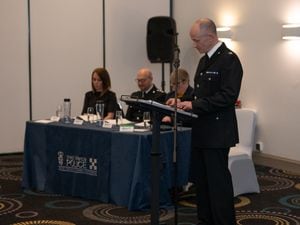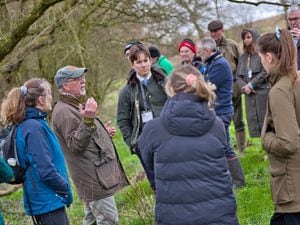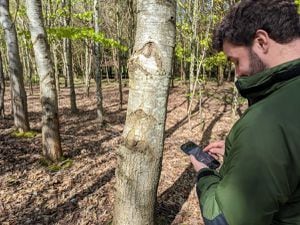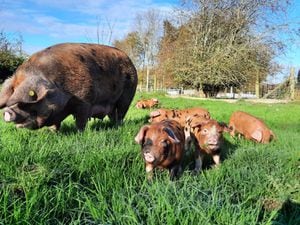Grammar is off the mark for apostrophes on Shropshire road signs
[gallery] It's the tiniest little mark but it can raise the strongest emotions, from cucumber's and potatoe's on the high street to mens magazines, girls toys and womens shoes in Tesco.
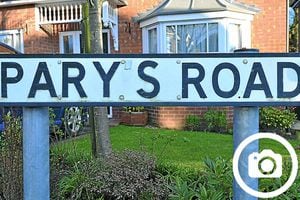
This week council bosses in Cambridge have earned the ire of grammar geeks after announcing that they will be banning apostrophes from street names as they believe they would be too "confusing" for people to understand.
Across the pond the Americans have long since dropped punctuation from official maps – President Theodore Roosevelt being the slayer of the apostrophe in 1906, when he ordered the standardisation of geographic names for federal use.
Have apostrophes had their day? Have your say in our poll and in the comment box below.
But fans of apostrophes are not even safe in Shropshire, with place names such as Exfords Green and St Martins apparently shunning the elegance of an 's.
Last year campaigners were out in force in Telford to protest against the loss of the apostrophe in new signs erected in Prince's Street, Wellington – the only road in the town with an official apostrophe.
After complaining to Telford & Wrekin Council, the signs were replaced and the punctuation restored to its rightful place.
Wellington historian Allan Frost said the punctuation was important as the street had been named in 1861 as a memorial to Prince Albert, Queen Victoria's beloved husband, who had just died.
Mr Frost said: "There has been a sad trend over the years for apostrophes to be omitted from street and road signs."
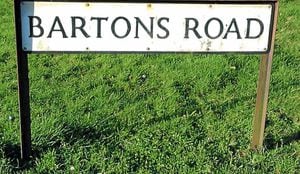
On the other side of the county, St Martins near Oswestry is a village which proudly flaunts its lack of punctuation.
In 1872 the village was known as St Martin, named after the village church dedicated to St Martin of Tours.
Villagers adopted an apostrophe to become St Martin's in the 20th century before the apostrophe disappeared later that century – although it still remains on many maps of the area.
Within Oswestry town itself, birthplace of war poet Wilfred Owen, a man who knew how to use an apostrophe, some street names appear at first glance to be lacking in the vital punctuation mark.
Neither Friars Avenue or Friars Close in the eastern end of the town have an apostrophe.
However, they were named as part of a group of roads which include Whitefriars, Greyfriars and Blackfriars, and so the friars in their names are a reference to these many coloured friars and don't signal roads belonging to the friars – which, of course, would demand a possessive apostrophe.
In Market Drayton, Barton's Lane with an apostrophe leads to Bartons Road without one, while opposite Market Drayton Primary School pupils can be forgiven for getting confused when they are greeted with a sign for Simons Road.
The mayor of Market Drayton, councillor Tim Beckett, said: "It is very strange that someone decided Barton's Lane should have an apostrophe whereas Bartons Road shouldn't. To me they are exactly the same and I think most people agree you need to at least be consistent.
"It's also surprising to me that Simons Road hasn't got one.
"I think if you are trying to educate you have to keep apostrophes in road signs and everywhere else they are needed."
Meanwhile the Shropshire Mines Trust, which runs the historic Snailbeach Mine near Shrewsbury, clearly has its fair share of punctuation pedants as its information pack about its "Blacksmiths' Shop" includes the aside: "The position of the apostrophe is deliberate! There are two forges, and two blacksmiths could have worked here."
Looking at a map of the county, Shrewsbury would appear to be mad for apostrophes, with Hill's Lane, St Chad's Terrace, St John's Hill, All Saints' Recreation Ground and Jane's Place all found within a stone's throw of the town centre.
Shrewsbury & Atcham MP Daniel Kawczynski praised residents for their attention to detail. He said: "I think it's great Shrewsbury has got it right, because ultimately we need to encourage youngsters to use the apostrophe correctly. They need our help to get it right."
Another town hot on its punctuation is Whitchurch, where all the streets which should have apostrophes are given them.
Zoe Dean, deputy clerk for Whitchurch Town Council, said it would be wrong to remove them from street signs.
She said: "I think it would be a very bad move to remove apostrophes from street signs because it is encouraging people not to learn simple spelling rules.
"Punctuation and grammar is important and I don't think we should be encouraging people not to use it.
"I do think a lot of students are not taught at a young enough age exactly how apostrophes work. I know I was taught in high school whereas I think youngsters would be better off if they learnt the rules in primary school."
It's not just street names where the apostrophe debate is raging – Bishop's Castle is a town which has resolutely stuck to keeping it.
Mayor Karen Bavastock said: "I always try to remember to put it in. If I don't there are people who will rap my knuckles.
"We should be using it – we should keep the apostrophe alive."
In Ludlow, Parys Road does not have an apostrophe, although St John's Lane across town does. The reason for the omission is unclear, although the road runs next to where Parys Stores, a business name also without an apostrophe, used to be on Coder Road. The road sign has an apostrophe, but it has been whited out.
John Polley, 74 and a retired English teacher, said: "You should use it if you can do it correctly. Who are these people accusing children of lowering standards when they can't do it themselves?"
Should it or shouldnt it be used? Your say:
Margaret Jones, 73, retired, from Maesbury Marsh, near Oswestry, said: "I feel one should put apostrophes in street names because you should be proud of English grammar. We're not American, we're British, and it's part of our language and should be used and not ignored."
Judith Polley, 75, a retired English teacher from Parys Road, Ludlow, said she was "appalled" at the dropping of apostrophes.
"There are two reasons for an apostrophe, to show possession or to show an abbreviation," she said. "It's part of the English language for goodness' sake. What else are we going to drop?
"When you see it, to me it just says 'you obviously don't understand it'. These days, if it's difficult people just don't bother. All this is seeping in and our language is changing."
John Polley, 74, also a retired English teacher from Parys Road, Ludlow, was also a senior GCSE examiner and wrote a spelling, punctuation and grammar textbook, took a different view.
"If you look at words that end with an s, 99 per cent of them don't have an apostrophe," he said.
"So I what I used to say is if you don't know how to use them, leave them out – if you leave them out you look careless, but if you use them wrongly you look stupid."
Gary Stinton, 47, owner of Acron Carpets on Parys Road, Ludlow, said he had not realised it was not supposed to have one.
"I think it should have it in – that's what I presumed," he said.
"It's on all our invoices, the sign outside and on the side of our vans."
Shrewsbury mayor Jon Tandy attributed the town's success to proper punctuation.
He said: "It's great to see that Shrewsbury is doing so well. It just shows that we know how to use the apostrophe."
Shrewsbury town crier Martin Wood said: "The people of Shrewsbury know how to spell properly. They know when an apostrophe is needed. We just have a problem with spelling the name of the town itself."
The mayor of Market Drayton, Councillor Tim Beckett, said: "When you come to everyday life you need to use punctuation properly or people will get confused.
"From a personal point of view if we stop using apostrophes we are going backwards.
"It's the same as text message abbreviation. I'm now starting to see that creeping into professional emails. To me it's going backwards."
By Pam Kingsley

